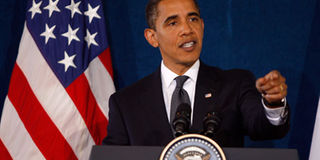Is Obama’s greatest gift to Africa two great speeches?

US President Barack Obama. Photo/ REUTERS
Only African-Americans can understand the feeling of sheer elation Africans felt when Barack Obama was elected President of the United States on November 4, 2008. When Obama’s impact on Africa is measured, nothing can compare to that satisfaction that the most powerful nation in history is presently led by a member of the Black race.
On so-called bread-and-butter issues, the record is quite different. That has come as a disappointment to Africans who pinned exaggerated hopes on his presidency, more so people in his father’s homeland of Kenya. He did send the right signals though, starting with an electrifying speech in Cairo in June last year that was however addressed to the Muslim world more than anybody else.
Powerful oration
Obama followed that up a month later with another powerful oration on democracy and good governance delivered in Ghana, which was the first and so far only sub-Saharan African nation Obama has set foot in. In a way, the Obamaist prescriptions for Africa on good governance do not materially differ from those of his white predecessors.
That has been a bit of a disappointment for Africans who expected he would come with a more nuanced eye on the unique post-colonial complexities of the continent that a white American President, even a well-meaning one like Bill Clinton, cannot quite untangle.
Neither has Obama found it necessary to alter the general diplomatic tone toward the continent, where resident US ambassadors routinely deliver blunt lectures that never fail to drive African governments up the wall. He has been particularly hard on Kenya, where he has intensified America’s long-running anti-corruption campaign through visa bans targeted at top government officials.
He came to listen
It would be wrong, of course, to suppose that Obama doesn’t care. An exclusive roundtable meeting he organised with African presidents on the sidelines of last year’s UN General Assembly was a telling pointer, and a first of its kind. And he came to listen, not just to issue edicts.
Presidents Paul Kagame and Ellen Johnson-Sirleaf of Rwanda and Liberia, respectively, updated him on where the continent stood.
But perhaps the best insight was given by Secretary of State Hillary Clinton when she was in Nairobi in August last year to open the AGOA conference. Veering away from her prepared speech, she told the assembled hosts about her boss’s intentions toward Africa: “He means well…”
It has been difficult to some Africans to comprehend how Obama could mean well to the mother continent when he has dashed so many hopes by not delivering the trillions in aid money they expected. Paradoxically, it was the hated George W. Bush who today ranks as the US President who committed the most money for the continent, mainly in the fight against Aids.
And it was Bill Clinton who came up with the idea of AGOA, which has dramatically multiplied Africa’s trade figures with America, especially in textiles. It is often not appreciated that Obama has to walk a delicate tightrope when it comes to Africa. The last thing he would want is to give Americans the impression that the only thing on his mind is the continent.
That would raise hackles. He has to balance any attention to Africa with the heavy domestic workload Americans elected him to handle. After all, he came into office in the thick of a calamitous financial meltdown that was driving major banks and mortgage firms under. Along the way unemployment figures have risen sharply, plus there is the priority he has placed on reforming healthcare in America.
A moment of history
But over and above everything else, what tempers his interventions in Africa, and even on issues specific to fellow African-Americans, is the sensitivity against appearing to the rest of America as just a typical “angry Black man” who happens to be occupying the White House.
He was able to convince white America to elect him in the first place because he came across as moderate and reasonable. Often, though, Africa is victim to all sorts of accidents – big and small – that not even Obama can do much about. An example is the Christmas Day attempted bombing of an American airliner by a Nigerian would-be terrorist.
This has resulted in exceptionally ruthless airport searches for Muslim Africans travelling overseas, an inconvenience that could arguably be said to be against Obama’s nicer instincts. So, will Obama’s scorecard in Africa be just about the lovely speeches he gave in Cairo and Accra, and the others he may make if he ever returns to Africa? He has three years to go, and seven in total if he wins a second term in 2012.
For Africans, his election was a miracle in itself, a moment of history. The psychological uplift it provided was profound. In the end, it will be in the success he will show in aligning his powerful country with Africa’s struggle to be in the mainstream of the global economy that he will be deemed to have truly deliver.
Gitau Warigi, is the West and Central Africa Editor, Africa Division of the Nation Media Group


